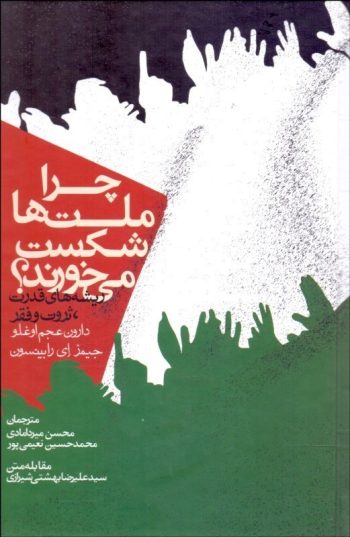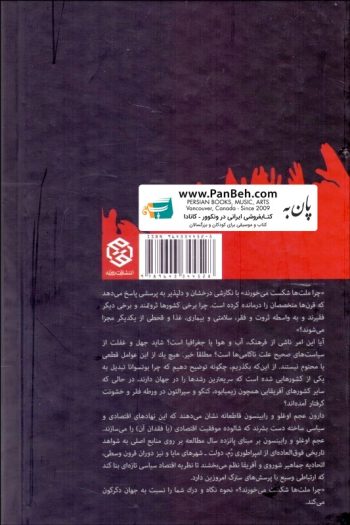Simply, no. None of these factors is either definitive or destiny. Otherwise, how to explain why Botswana has become one of the fastest growing countries in the world, while other African nations, such as Zimbabwe, the Congo, and Sierra Leone, are mired in poverty and violence?
Daron Acemoglu and James Robinson conclusively show that it is man-made political and economic institutions that underlie economic success (or lack of it). Korea, to take just one of their fascinating examples, is a remarkably homogeneous nation, yet the people of North Korea are among the poorest on earth while their brothers and sisters in South Korea are among the richest. The south forged a society that created incentives, rewarded innovation, and allowed everyone to participate in economic opportunities.
The economic success thus spurred was sustained because the government became accountable and responsive to citizens and the great mass of people. Sadly, the people of the north have endured decades of famine, political repression, and very different economic institutions—with no end in sight. The differences between the Koreas is due to the politics that created these completely different institutional trajectories.
Based on fifteen years of original research Acemoglu and Robinson marshall extraordinary historical evidence from the Roman Empire, the Mayan city-states, medieval Venice, the Soviet Union, Latin America, England, Europe, the United States, and Africa to build a new theory of political economy with great relevance for the big questions of today, including:
– China has built an authoritarian growth machine. Will it continue to grow at such high speed and overwhelm the West?
– Are America’s best days behind it? Are we moving from a virtuous circle in which efforts by elites to aggrandize power are resisted to a vicious one that enriches and empowers a small minority?
– What is the most effective way to help move billions of people from the rut of poverty to prosperity? More philanthropy from the wealthy nations of the West? Or learning the hard-won lessons of Acemoglu and Robinson’s breakthrough ideas on the interplay between inclusive political and economic institutions?
Why Nations Fail will change the way you look at—and understand—the world.
Brilliant and engagingly written, Why Nations Fail answers the question that has stumped the experts for centuries: Why are some nations rich and others poor, divided by wealth and poverty, health and sickness, food and famine?
About Author:
Daron Acemoglu is the Killian Professor of Economics at MIT. In 2005 he received the John Bates Clark Medal awarded to economists under forty judged to have made the most significant contribution to economic thought and knowledge. He is also the co-author of The Narrow Corridor: States, Societies, and the Fate of Liberty.James A. Robinson, a political scientist and an economist, is the David Florence Professor of Government at Harvard University. A world-renowned expert on Latin America and Africa, he has worked in Botswana, Mauritius, Sierra Leone, and South Africa. He is also the co-author of The Narrow Corridor: States, Societies, and the Fate of Liberty.
کتاب چرا ملت ها شکست میخورند؟ ریشه های قدرت، ثروت فقر این کتاب نوشته دارون عجم اوغلو، جیمز ای.رابینسون است به ترجمه محسن میردامادی، محمدحسین نعیمی پور و مقابله متن: سید علیرضا بهشتی شیرازی است. «چرا ملت ها شکست میخورند» با نگارشی درخشان و دلپذیر به پرسشی پاسخ میدهد که قرن ها متخصصان را درمانده کرده است. چرا برخی کشورها ثروتمند و برخی دیگر فقیرند و به واسطه ثروت و فقر، سلامتی و بیماری، غذا و قحطی از یکدیگر مجزا میشوند؟» آیا این امر ناشی از فرهنگ، آب و هوا یا جغرافیا است؟ شاید جهل و غفلت از سیاست های صحیح علت ناکامی ها است؟ مطلقا خیر. هیچ یک از این عوامل قطعی یا محتوم نیستند. از این که بگذریم، چگونه توضیح دهیم که چرا بوتسوانا تبدیل به یکی از کشورهایی شده است که سریعترین رشدها را در جهان دارند، در حالی که سایر کشورهای آفریقایی همچون زیمباوه، کنگو و سیرالئون در ورطه فقر و خشونت گرفتار آمده اند؟ دارون عجم اوغلو و رابینسون قاطعانه نشان می دهند که این نهادهای اقتصادی و سیاسی ساخته دست بشرند که شالوده موفقیت اقتصادی (یا فقدان آن) را می سازند. عجم اوغلو و رابینسون بر مبنای پازنده سال مطالعه بر روی منابع اصلی به شواهد تاریخی فوق العاده ای از امپراطوری رُم، دولت-شهرهای مایا و نیز دوران قرون وسطی، اتحادیه جماهیر شوروی و آفریقا نظم می بخشند تا نظریه اقتصادی سیاسی تازه ای بنا کند که ارتبازی وسیع با پریش های سترگ امروزین دارد. «چرا ملت ها شکست می خورند؟» نحوه نگاه و درک شما را نیست به جهان دگرگون می کند.
درباره نویسنده:
دارون عجم اغلو استاد اقتصاد کیلیان در MIT است. در سال 2005 او مدال جان بیتس کلارک را دریافت کرد که به اقتصاددانان زیر چهل سال اعطا شد که به نظر می رسید مهم ترین سهم را در اندیشه و دانش اقتصادی داشته اند. او که یک متخصص مشهور جهان در آمریکای لاتین و آفریقا است، در بوتسوانا، موریس، سیرالئون و آفریقای جنوبی کار کرده است. او همچنین یکی از نویسندگان دالان باریک: ایالات، جوامع و سرنوشت آزادی است.




















